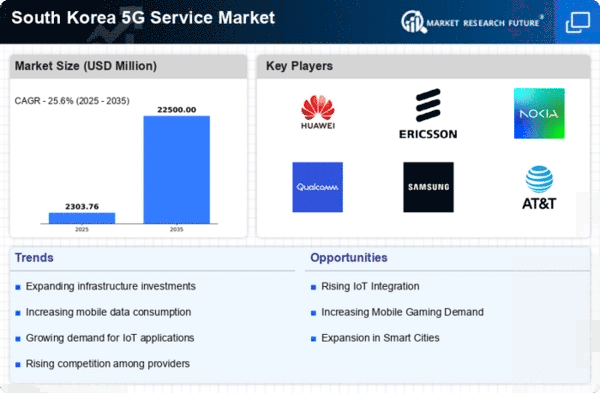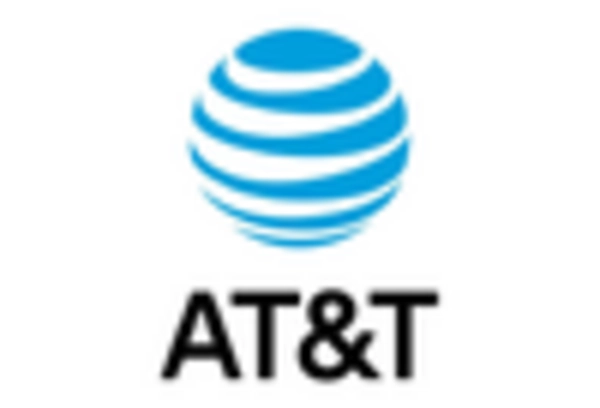Expansion of Smart City Initiatives
The expansion of smart city initiatives is a crucial driver for the 5g service market in South Korea. As urban areas continue to grow, local governments are investing in smart technologies to improve infrastructure, enhance public services, and promote sustainability. By 2025, it is anticipated that over 50% of South Korean cities will implement 5g-enabled smart city solutions, such as intelligent traffic management and public safety systems. These initiatives not only improve the quality of life for residents but also create a demand for advanced telecommunications services. The integration of 5g technology into smart city projects is expected to facilitate seamless connectivity and data exchange, thereby significantly contributing to the growth of the 5g service market.
Rising Demand for High-Speed Connectivity
The demand for high-speed connectivity is a primary driver of the 5g service market in South Korea. With the proliferation of smart devices and the Internet of Things (IoT), consumers and businesses alike are seeking faster and more reliable internet services. As of 2025, it is estimated that over 80% of households in South Korea will have access to 5g services, reflecting a significant shift in consumer preferences. This rising demand is not only limited to individual users but also extends to industries such as healthcare, automotive, and entertainment, which increasingly rely on high-speed connectivity for their operations. Consequently, telecommunications providers are investing heavily in infrastructure to meet this growing need, further propelling the 5g service market.
Competitive Landscape Among Telecom Providers
The competitive landscape among telecom providers in South Korea plays a pivotal role in shaping the 5g service market. Major players are engaged in aggressive strategies to capture market share, including the introduction of innovative pricing models and bundled service offerings. As of 2025, the market is characterized by a fierce rivalry, with providers investing heavily in marketing and customer acquisition. This competition is likely to lead to improved service quality and expanded coverage, benefiting consumers and businesses alike. Additionally, partnerships with technology firms to develop new applications and services are becoming increasingly common, further stimulating growth in the 5g service market. The dynamic nature of this competitive environment suggests a promising outlook for the industry.
Increased Investment in Digital Transformation
The 5g service market in South Korea is significantly influenced by increased investment in digital transformation across various sectors. Businesses are recognizing the potential of 5g technology to enhance operational efficiency and customer engagement. As of 2025, investments in digital transformation initiatives are expected to exceed $15 billion, with a substantial portion allocated to 5g-related projects. This trend is particularly evident in industries such as manufacturing, where 5g enables real-time data analytics and automation. The push for digital transformation is likely to create new revenue streams and improve competitiveness, thereby driving further growth in the 5g service market. Companies that leverage 5g technology are positioned to gain a competitive edge in an increasingly digital economy.
Technological Advancements in Telecommunications
The in South Korea is experiencing rapid growth due to continuous technological advancements in telecommunications. Innovations in network architecture, such as the deployment of small cells and massive MIMO (Multiple Input Multiple Output) technology, enhance network capacity and efficiency. As of 2025, the market is projected to reach approximately $10 billion, driven by increased demand for high-speed internet and low-latency applications. These advancements not only improve user experience but also enable new services, such as augmented reality and smart city applications, which are becoming increasingly prevalent in urban areas. The integration of artificial intelligence in network management further optimizes performance, indicating a robust future for the 5g service market in South Korea.
















